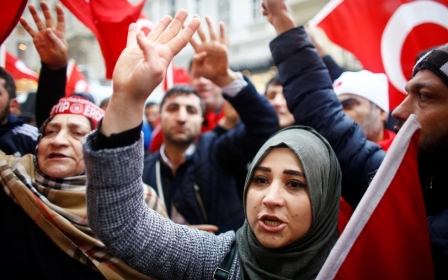Turkey reassures investors, says Dutch business not at risk

Dutch investment in Turkey is not at risk from the diplomatic row between the two countries, as Ankara's ire is focused on the Dutch government, not its people or businesses, Turkey's minister for EU affairs told Reuters.
Turkey suspended high-level diplomatic relations with the Netherlands on Monday, banning the Dutch ambassador from the country and preventing diplomatic flights from landing in retaliation for the Dutch barring Ankara's ministers from speaking to rallies of overseas Turks.
Despite the furore, minister Omer Celik said Ankara was making a call to businesses worldwide that Turkey was a safe country for investment.
"Dutch businessmen who invest, have businesses and create employment in Turkey are included in this (call). They are definitely not part of the crisis," Celik said in an interview late on Tuesday.
Asked if Dutch companies active in Turkey would be affected by the row, Celik said: "The private sector, business world, tourists and the people of the Netherlands are not a part of the crisis."
His comments could provide some reassurance to investors after deputy prime minister Numan Kurtulmus said on Tuesday that economic sanctions against the Netherlands could be in the works.
Dutch direct investment in Turkey amounts to $22 billion, making the Netherlands the biggest source of foreign investment with a share of 16 percent.
Turkish exports to the Netherlands totalled $3.6 billion in 2016, making it the tenth largest market for Turkish goods, according to official data.
The row exploded after Turkish President Tayyip Erdogan branded the Netherlands "Nazi remnants" at the weekend for barring Turkish ministers from speaking in Rotterdam.
Some analysts have said they don't expect the affair to have immediate economic consequences. However, foreign investor sentiment towards Turkey has been badly bruised by widening security concerns and fears of growing authoritarianism.
Overseas Turks
Erdogan is drumming up support in the run-up to the 16 April referendum on expanding his powers, and has been looking to the large number of Turks living in Europe to help secure victory. But Turkish campaigning abroad has raised tensions with several European countries, including Germany.
The row has called into question a landmark agreement last year in which Turkey promised to stop migrants and refugees using it as a route to enter the European Union, in return for EU aid and the promise of visa-free travel to the bloc.
Celik said he believed the time had come for Turkey to reassess the deal, as it had become clear the EU would not take a fair stance on the visa issue. Turkey had fulfilled its side of the agreement but the EU had not kept its word, he said.
Progress on the issue has been held up by legal wrangling. Brussels says Ankara needs to narrow its anti-terror laws to meet EU standards; Turkey says it needs the laws in their current form to combat multiple security threats.
Stay informed with MEE's newsletters
Sign up to get the latest alerts, insights and analysis, starting with Turkey Unpacked
Middle East Eye delivers independent and unrivalled coverage and analysis of the Middle East, North Africa and beyond. To learn more about republishing this content and the associated fees, please fill out this form. More about MEE can be found here.




